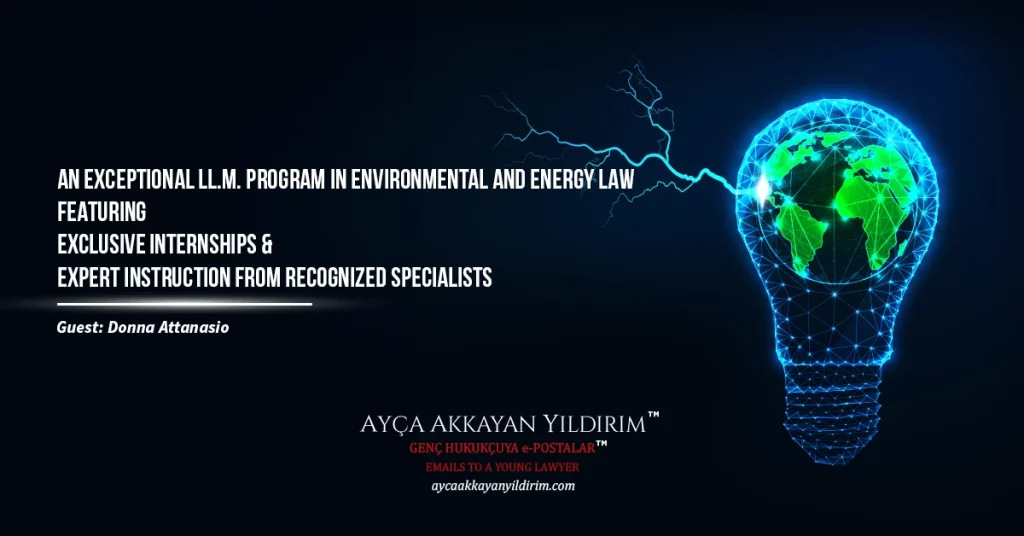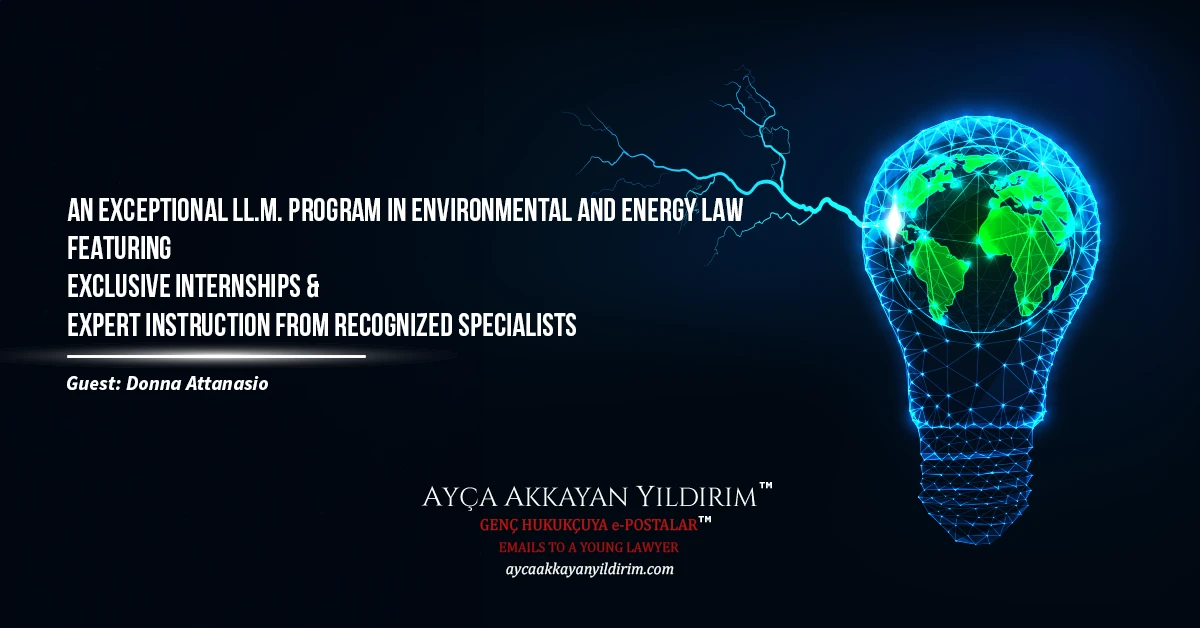Tuesday, March 5, 2024


Date : March 5, 2024
To : Young Lawyers
Re : AN EXCEPTIONAL LL.M. PROGRAM IN ENVIRONMENTAL AND ENERGY LAW FEATURING EXCLUSIVE INTERNSHIPS & EXPERT INSTRUCTION FROM RECOGNIZED SPECIALISTS
INTERNATIONAL LL.M. PROGRAMS: GEORGE WASHINGTON UNIVERSITY LAW SCHOOL, Washington, D.C., USA
Donna M. Attanasio, Managing Director of The George Washington University (GWU) Alliance for a Sustainable Future and former Assistant Dean for Energy Law at The GWU Law School (GW Law), thank you for dedicating time from your busy schedule to share your expertise and experiences with us. GHK
GHK: Managing Director Attanasio, could you provide an overview of the LL.M. specializing in Energy & Environmental Law at GWU? What are its core objectives and key strengths?
DA: Thank you for this opportunity to share our program with your audience. I will start by explaining the structure of the program.
GW Law has an Environmental & Energy Law (E&EL) program that encompasses two distinct but interrelated areas of study: Environmental Law and Energy Law. Across the E&EL program, we offer four specialized LL.M. degrees: Environmental Law, International Environmental Law, Environmental & Government Procurement Law, and the one that is the focus of this interview, Energy & Environmental Law.
Students can take energy law classes in partial fulfillment of any LL.M. degree. However, the Energy & Environmental Law LL.M. is specifically structured to give students a strong grounding in Energy Law plus an understanding of the environmental regulations that are shaping the energy transition and the energy industry of the future.
The strength of our energy law program is its breadth and depth. Because we are a large law school located in Washington, DC, close to lawmakers and regulators who often teach in our programs, we have the advantage of offering many diverse energy courses every year. We offer a survey course of US energy law offered in both the Spring and Fall semesters, and separate specialized courses addressing the law of oil & gas, atomic energy, off-shore wind, the electric grid of the future, commodity trading in energy and environmental financial products, and experiential courses (discussed below), each of which is typically offered once a year. Students can also count international project finance toward their Energy & Environmental LL.M. as well as choose from multiple electives in environmental law and other areas,
A very unique feature is our new double degree program with the University of Groningen (UG) in the Netherlands. Students accepted to this program will study in the fall in at UG and in the Spring at GW Law. They have the following summer to complete an internship and their thesis. Upon graduation, they are awarded both the LL.M. in Energy & Climate Law from UG and the LL.M. in Energy & Environmental Law from GW Law.
In sum, students studying energy law at GW Law have access to a very strong and varied energy law curriculum. Plus, they can take courses from our large selection of environmental law courses. LL.M. students typically need 7 to 8 courses in their specialized area of study to complete their degree, and the E&EL program offers roughly two dozen or more courses every year from which students select those needed for their specialization.
GHK: What advice would you give to students considering pursuing an LL.M. in Environmental & Energy Law at GWU? What qualities or experiences make a candidate stand out?
DA: No single profile adequately describes all our LL.M. students. The variety of strengths and experiences they bring to the program makes the LL.M. community so vibrant.
We have many international students, many (perhaps most) of whom come to us after practicing in their own countries. Some are looking for new ideas that they can help implement in their home countries, and others are advancing their careers as international lawyers. US students generally enroll in the LL.M. program to gain more depth than was available at the school that awarded their JD or because they are shifting their career path. In addition, many of our LL.M. students are active military. They typically have extensive litigation experience and are seeking to acquire energy-specific and environmental-specific knowledge to expand their career options.
In terms of preparation, the most successful candidates come to us with some background in energy or environmental law and a clear idea of what they hope to achieve. But as I noted above, those qualities take many different forms.
GHK: Could you elaborate on the curriculum for students specializing in energy law at GWU? How does it integrate practical skills with legal theory?
DA: Students must take four courses in energy law and at least 3 in environmental law for the Energy & Environmental LL.M. and complete a written work requirement. Some elect to write a thesis, which usually takes the place of 2 courses. Alternatively, they satisfy the writing requirement with one or two long research papers in conjunction with a course. Thus, students must demonstrate their research, analysis, and writing skills to graduate, which are foundational practice skills, as well as pass their theory courses.
Several of our E&EL course offerings are “experiential courses.” These courses are designed to teach students how to apply the law, for example, through exercises that require drafting short “client-ready” memoranda, giving presentations, drafting pleadings, or making mock arguments.
In addition, students can count an internship toward their LL.M. degree. Because of our downtown DC location, a few blocks from the White House and next door to the World Bank, we have easy access to many non-governmental and governmental organizations.
GHK: What kind of career paths do graduates of this program typically pursue? How does the program equip them for roles in both the public and private sectors?
DA: Career paths are quite varied, and for our international students in particular, their options are often defined by their sponsors or the opportunities in their home countries. In the US, many of our LL.M. graduates who are US citizens have accepted jobs in federal or state energy regulatory agencies. Both international and US students are working in private practice and non-governmental organizations, including academia.
Part of the student’s preparation, in addition to the curriculum, comes from the networking opportunities in DC, the connections to alumni that we help them make (discussed more below), and other students. LL.M. students take most of their classes with JD students, so they can develop a diverse and large network of LL.M. and JD students from many countries. We also work closely with bar associations, non-governmental agencies, and private firms to bring professional events to campus and open doors for our students to attend events elsewhere in DC. We also have a career counselor specifically assigned to the LL.M. program.
The strong curriculum and numerous opportunities for professional development, combined, prepare our students for careers in a variety of organizations.
GHK: What are some of the most pressing legal challenges in environmental and energy law today, and how does the program prepare students to address them?
DA: Our most pressing problem is implementing an energy transition that takes into account life-cycle environmental impacts, equity, and justice. Over seven hundred million people in the world lack access to modern energy services. This adversely impacts their health, education, opportunities to work, and general well-being. The production and distribution of energy – even “clean” energy – always has some adverse environmental impact. Yet, people also need a clean environment and healthy ecosystems to thrive. Thus, the most pressing legal challenge we face during this period of rapid global warming is establishing laws that provide people with clean, affordable energy and a healthy environment.
Our program recognizes the importance of both energy and the environment. The Energy & Environmental LL.M., particularly, is very carefully structured to help students become conversant in both disciplines. Several of our courses have a particularly strong emphasis on the issues of energy equity and environmental justice, recognizing that all people deserve these basic rights. Our goal is for students to leave the program with an understanding of the real-world impact of law and regulation and how law and policy can be structured, taking into account divergent views of the role of government and the market in providing these basic rights.
GHK: What do you consider the biggest challenges currently facing energy law, and how does GWU’s program prepare students to meet these challenges?
DA: The energy transition is progressing too slowly, and even at this slow pace, too many people are left behind. It is imperative that we integrate energy justice and environmental justice into every conversation and initiative. Our curriculum’s holistic approach sensitizes students to the complexities of real-world practice.
GHK: Given your expertise, what global energy issues do you think need more legal attention and why?
DA: We need to focus on the transition of the workforce, energy conservation, energy efficiency, and responsible, environmentally-sensitive development of new energy sources and infrastructure. These are all elements of a just transition to a clean energy economy, which is imperative for our time.
GHK: As the energy sector moves towards sustainability, what do you think about the role lawyers play in advancing renewable energy initiatives?
DA: There is so much to do! All laws, regulations, and policies are developed by reference to some known context. For example, electric energy markets were designed around the implicit assumption that the system would be balanced using dispatchable generation (e.g., gas-fired plants) and that electricity was fungible. But with consumers demanding green power and some governmental bodies implementing programs that encourage the use of generation that has low or no carbon emissions during generation, aspects of our market systems need to be reconsidered and refined. At the same time, we need to ensure regions that have historically lacked adequate energy systems are able to access affordable energy to build their economies and do so with minimal environmental degradation. Lawyers have a critical role in removing barriers, building appropriate legal frameworks for the clean energy economy, and protecting consumers.
GHK: Can you discuss the role of the alumni network for LL.M. in Environmental & Energy Law? How does it contribute to the current students’ professional growth?
CV: GW Law has over 30,000 living alumni. This deep pool can be hard for a student to penetrate. To make the network more relevant and accessible to our energy law students and alumni, the Energy Law Program created “Energy Connectors,” an energy-law affinity group for alumni. This smaller group typically has several events each year, primarily for the purpose of networking. Students (our future alumni) are always welcome to participate. In addition, alumni are often called upon to assist students with career advice, mock interviews, or other career-building skills when a student requests such support.
GHK: In closing, reflecting on your decade-long journey of building and shaping the Energy Law program at GWU, what lasting impact do you hope it will have on its graduates?
DA: Energy Law has changed tremendously since the time I entered the field, and it will keep changing as we wrestle with how to meet people’s need for this essential service. So, while we want students to have enough familiarity with existing law to enter practice and quickly become productive, it is even more important that we teach them to think critically and help them develop the skills they need to continue to learn and grow as the industry changes. Most importantly, we try to instill an understanding of the critical role of energy in the well-being of people and the planet so that whatever career path they take, our graduates will recognize and seize the opportunity to help effect positive change and will have the confidence and ability to succeed.
